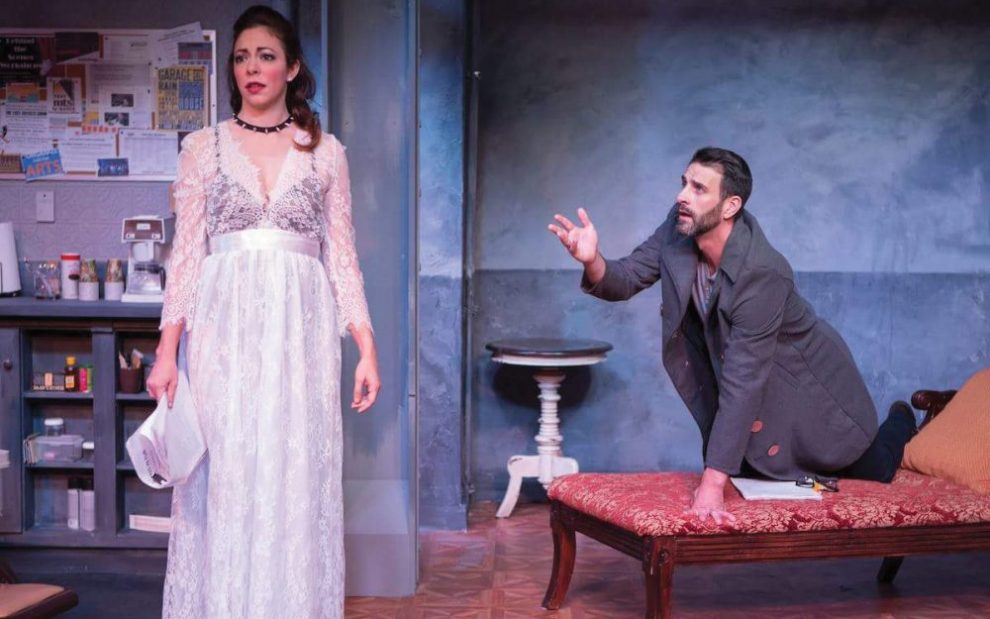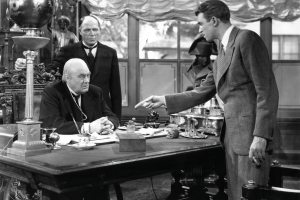Like many people with a clear sense of vocation, actor-producer Angela Sauer can see the signs stretching all the way back to childhood. “I came out of the womb tap dancing,” she jokes. Her parents put her in her first acting class when she was just 3 years old.
Raised in a Catholic family in Michigan, Sauer is now a working actor in Los Angeles with impressive credits on both stage and screen, including NBC’s Quantum Leap and Netflix’s Sweet Magnolias. She is a member of SAG-AFTRA (the screen actors’ union) and was elected to the National Council of Actors’ Equity Association, the union of professional stage actors and stage managers.
Although she spent her school years in drama club and community theater, Sauer did not plan on studying acting further. Instead of auditioning for acting programs, she chose Saint Mary’s College, a women’s college founded by the Sisters of the Holy Cross, and bounced between several majors before realizing what she’d always been called to do: tell stories. For Sauer, Saint Mary’s was a “loving cocoon of faith” that helped her grapple with what it meant to be a Catholic artist on her own terms.
Acting is not an easy profession to approach on one’s own terms. With so many actors and comparatively few roles, it can be risky to be selective about the work you’re willing to do; actors are always aware that there are dozens of others ready to replace them. “We have so little control over what our art is as actors most of the time,” Sauer says. “My faith strengthens my ability to set boundaries for myself in my work.”
She points to two examples in particular. The first came at Saint Mary’s in the form of a frank conversation with her professors about her future in the field and, more pressingly, whether she felt comfortable swearing in an audition monologue. Although her teachers were upfront that having a boundary about swearing could rule out large amounts of work, “they told me that it was up to me to decide for myself what my wheel of morality would be as an actor,” she says. It was an empowering conversation for a young artist on the brink of a career that, from Shakespeare’s day to our own, can be morally dubious in what it demands of its performers.
The other formative experience came in graduate school at Florida State University’s prestigious Asolo Conservatory for Actor Training, when Sauer was cast in a role that required her to take the Lord’s name in vain—something she was deeply uncomfortable doing.
“When you play a murderer, you don’t have to murder someone,” she remembers thinking. “When it comes to taking the Lord’s name in vain, that’s something I had to actually do. And I didn’t know what to do about it.”
She turned to the internet for help and found a blog run by a nun (she can’t remember the exact name now). She wrote a letter explaining her dilemma, and the nun wrote a post in response.
“Basically, [the nun] said, ‘God knows you’re an actor. What you have to look at is not what I’m doing in this play, but what is this play doing in the world?’ ” Sauer says. “ ‘If the ultimate message of the play is something that God would be in favor of, then tell the story.’ ”
In this case, the story was about forgiveness and redemption—something Sauer decided was a positive, holy message. She agreed to take the role.
As her career has continued on stage and screen, Sauer still uses this barometer to discern the work that aligns (or doesn’t) with her values: She won’t do sexual nudity, for example, or make fun of anyone’s religion. She’s turned down roles over both of these boundaries.
“My faith allows me to stand up for myself and advocate for myself, to get some clarity about the work I do and do not want to put into this world,” she says. “There’s power in knowing you can say no.”
But along with the power of saying no, acting has given Sauer a profound way of saying yes to God. “I’ve prayed a lot about being an actor, because it’s a weird journey to go on,” she says. The constant rejection, frequent moving, and irregular work schedule—not to mention the grueling process of auditioning that results in paid work just a fraction of the time—is a lot to sign up for.
“But I do believe with my whole heart that God put me on this Earth to be a performer, to be a storyteller, to heal people, to entertain, and to educate by helping to communicate messages that might not get to them any other way,” Sauer says. “The point is not to be famous. The point is that I’m telling these stories, telling these lessons, spreading positivity, making somebody laugh, helping somebody cry, giving a family something to go home and talk about at dinner—that can mean so much to people.”
She knows this because throughout her career people have told her so. A woman who’d experienced sexual harassment approached her after seeing Venus in Fur, in which Sauer played an actress who flips the script on a male director, and said, “You made me feel I got some of my power back.” A red-haired girl who’d been shy and self-conscious positively glowed with excitement and belonging after seeing Sauer in a production of Anne of Green Gables. In that example in particular, Sauer remembers seeing God at work.
“It was like, ‘Oh my goodness, I just saw it—I just saw theater change a child.’ I watched this kid get brave. If we can affect five kids, or 10 kids, or a couple of adults . . . we’re empowering them in this really special way,” Sauer says.
Seeing this instant human impact makes her vocation as an artist become “really real.”
“In order to sustain yourself as an actor, you have to know why you’re doing it, and it has to be a reason that is bigger than you and your ego,” Sauer says. “You can’t do it for the fame; you might not get it. Can’t do it for the money; it doesn’t exist. It has to be about what you’re in service to. I do believe that with my art, I’m in service to God, in service to other artists, and there are people that need the messages that I am really good at sending. I believe it has the power to change people’s lives.”
That is Sauer’s prayer every time she performs. She frequently asks the saints for their intercession, especially Vitus and Genesius, the patrons of theater, and invites fellow actors to join her in nondenominational prayer before performing.
“We pray we will have a great show tonight, that every line will pour out of us as if we were born to do this,” she says, “that the audience will be here with open hearts and open minds, ready to listen and learn and laugh and cry and take any positive messages . . . and that every single person leaves here after the show a little bit better than they were before.”
This article also appears in the February 2024 issue of U.S. Catholic (Vol. 89, No. 2, pages 45-46). Click here to subscribe to the magazine.
Image: Angela Sauer in Venus in Fur, courtesy of Angela Sauer













Add comment